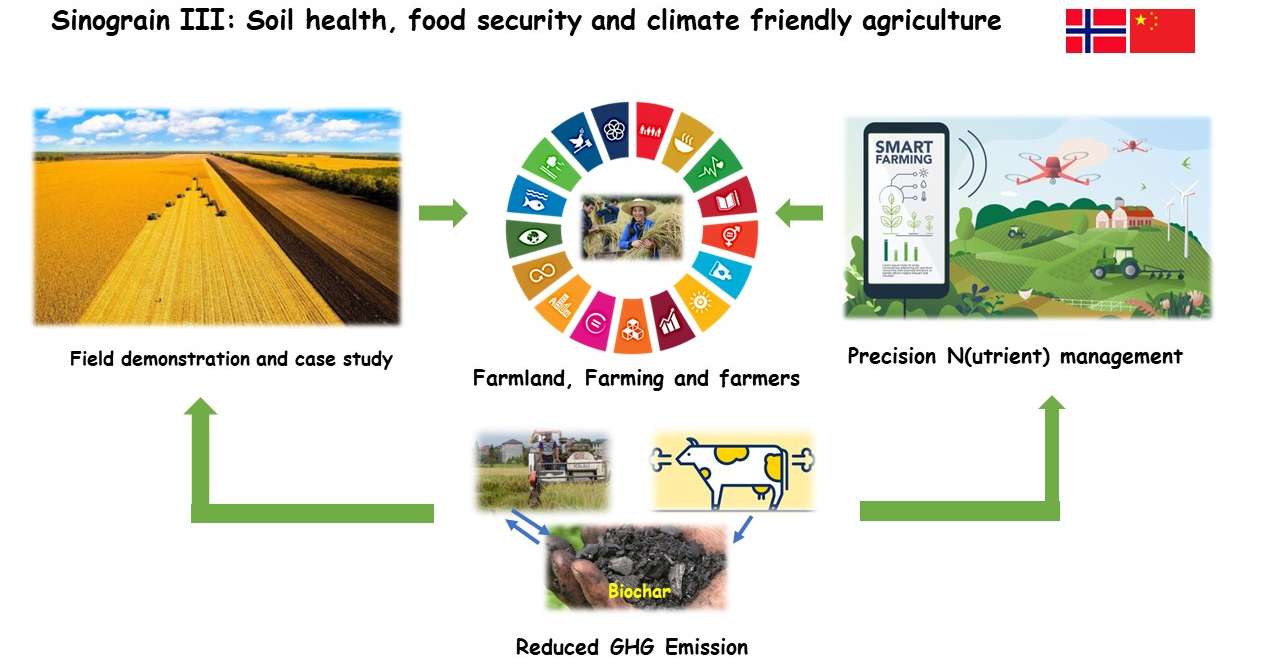Division of Environment and Natural Resources
Sinograin III: Smart agricultural technology and waste-made biochar for food security, reduction of greenhouse gas (GHG) emission, and bio-and circular economy

End: oct 2027
Start: sep 2023
The Sinograin III project’s overall objective is to contribute to the UN SDGs by widely implementing precision agriculture technologies and application of “waste-to-value” biochar products to achieve sustainable food production with minimized GHG emission, improve soil fertility and promote green growth/zero waste in modern agriculture in China.
Project participants
Krzysztof Kusnierek Nicholas Clarke Junbin Zhao Hang Su Thiago Inagaki Daniel Rasse Hege Særvold Steen Xinbing Wang Xiaoyu Liu Genxing Pan Lianqing Li Rongjun Bian Xiaoguang Yang Jin Zhao Qiang Cao Yuxin Miao Hainie Zha Junjun Lu Yue Li| Status | Active |
| Start - end date | 01.09.2023 - 30.10.2027 |
| Project manager | Jihong Liu Clarke |
| Division | Division of Environment and Natural Resources |
| Department | Biogeochemistry and Soil Quality |
| Partners | Chinese Academy of Agricultural Sciences, Beijing, China, Nanjing Agricultural University, Nanjing, China and China Agricultural University, China |
| Total budget | NOK 9704.240 |
| Funding source | The Norwegian Ministry of Foreign Affairs |
As IPCC’s report in 2023 stated, climate change has already shown a negative impact worldwide. Agriculture and livestock production contribute considerable greenhouse gas emissions (GHG) which must be reduced, at the same time as food security and animal-based protein food supply need to be increased to feed the expected 9 billion people in 2050.
There is no “quick-fix” and technologies for mitigation and adaptation include precision agriculture, digital and smart phone-based solutions, as well as a waste to value focus by recycling agricultural wastes (e.g. plant residues and animal manure) to produce biochar, contributing to not only improvement of soil fertility and reduction in the amount of synthetic fertilizer, but also to the reduction of GHG emissions in agriculture, especially methane and N2O.
The Sinograin III goal will be achieved by combining smart technological solutions with agricultural waste-derived biochar products. Through selected field trials (case studies) in China with different soil types and poor to rich soil fertility, the ultimate outcome of Sinograin III shall be circular solutions to ensure sustainable food production, restored and sustained soil fertility with minimum GHG emissions in the future.
